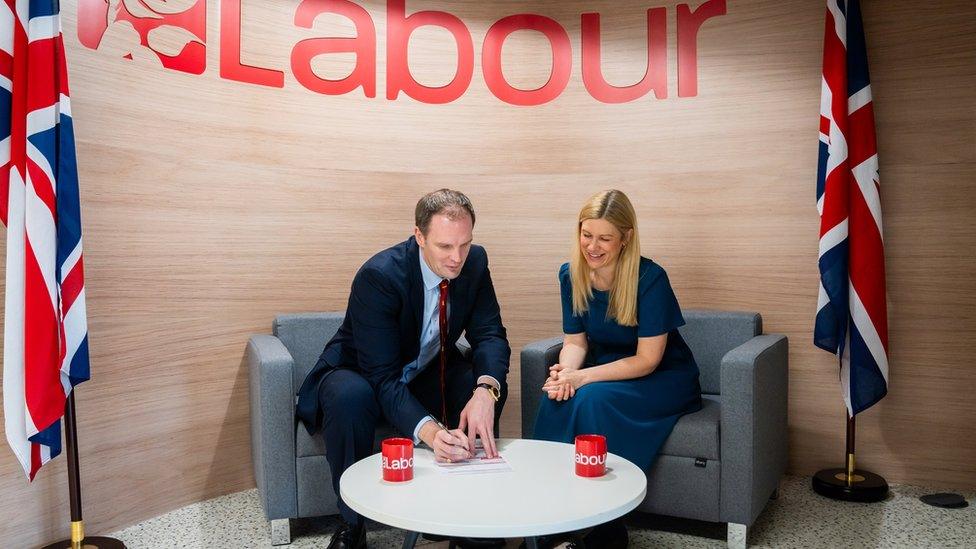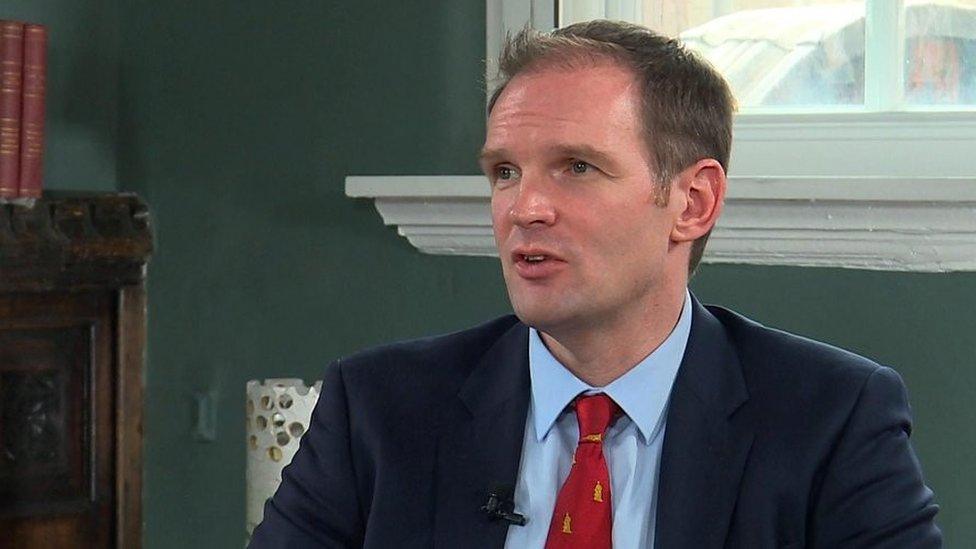Chris Philp defends government NHS record after Dan Poulter defects to Labour
- Published
Dan Poulter's defection to Labour questioned by Chris Philp
A minister has defended the government's record on the NHS, after a former Conservative MP defected to Labour.
In an exclusive interview with the BBC, Dr Dan Poulter said he could not look his NHS colleagues and patients in the eye and stay on as a Conservative MP.
Home Office Minister Chris Philp denied the Tories were deprioritising the NHS.
He added that more was being spent on the health service than at any point in history.
On the BBC's Sunday with Laura Kuenssberg programme, Dr Poulter, who works part time as a consultant psychiatrist, said the health service was now "unrecognisable" from how it was before he became an MP in 2010 and "patients deserve better".
The MP for Central Suffolk and North Ipswich added that Labour had a "track record" of improving the NHS and could be "trusted" with the health service.
Responding to Dr Poulter's resignation, Mr Philp told the programme: "I don't accept what Dan is saying at all.
"We're now spending £165bn a year on the NHS, that's more than ever, at any point in history."
He added: "That isn't the sign of a party de-prioritising the NHS. That is a sign of a political party, the Conservatives, investing heavily in our NHS because it is a priority."
He insisted the Conservatives did value public services and was investing "record amounts of money in both education and health".
Mr Philp also argued NHS waiting lists were now coming down despite the challenges of the pandemic and strike action.
Dr Poulter said he had "no animus" towards Prime Minster Rishi Sunak but was critical of the direction of his former party.
"We now have a Tory Party that resembles sometimes a little bit more a nationalist national party, rather than a party of the centre-right," he said.

Dr Poulter announced his defection on Saturday evening
It is the third Conservative defection since 2019.
Lee Anderson who sat briefly as an independent joined Reform last month and Christian Wakeford left the Conservatives for the Labour Party in 2022.
Labour leader Sir Keir Starmer has welcomed Dr Poulter's defection, saying "it's time to end the Conservative chaos".
Asked whether he was offered anything to join Labour, such as a seat in the House of Lords, shadow health secretary Wes Streeting told the programme: "Not that I'm aware of.
"He said very clearly to me when I was talking to him this week about how he might help, he's going back to the NHS full-time when Parliament is dissolved, which can't come soon enough as far as we're concerned."
Liberal Democrat health spokeswoman Daisy Cooper said the defection was "another blow to Rishi Sunak's authority".
"Former lifelong Conservative voters are turning away from this government because they can see the damage done to the NHS from years of neglect," she said.
"In many parts of the country these people are switching to the Liberal Democrats, as the party with a clear plan to fix both the NHS and social care."
Watch: Wes Streeting says millions of Conservative voters feel "politically homeless"
Dr Poulter, who served as a health minister under the coalition government, has said he will sit as a Labour MP until the general election and then stand down.
No date for the next general election has been set - but it has to take place before the end of January 2025.
Mr Sunak has said his "working assumption" is there will be an poll in the second half of this year, with most commentators expecting this to be in the autumn.
However, there has been growing speculation the PM could decide to call an early election to prevent a challenge to his leadership if the Tories suffer heavy losses in Thursday's local elections in England and Wales.
In an interview with Sky News, recorded before Dr Poulter's defection, Mr Sunak refused to rule out a July election, adding: "I'm not going to say anything more than I've already said, I've been very clear about that."
The Conservatives are currently trailing Labour in the polls, but Mr Philp predicted his party's ratings would "significantly improve" closer to a general election when people are confronted with the choice between Mr Sunak and Sir Keir.
"I think as we continue to deliver and get things done, the public will appreciate that," he said.
"I think as we get closer to an election, most likely in the autumn, it becomes more of a choice, rather than a sort of referendum on do you feel grumpy with the government. Clearly, at the moment, people do feel grumpy with the government.
"But as we get closer to an election, it's not so much a referendum on grumpiness. It becomes actually a choice - who do you want to run the country?"
Meanwhile, Mr Philp was also asked about his appearance on the BBC's Question Times earlier this week, where he appeared to confuse two African countries, Rwanda and the Democratic Republic of Congo.
"I was struggling a little bit to hear the question," he said.
"I was asking that as a clearly rhetorical question rather than a substantive question, as I think any fair-minded listener would conclude."
Related topics
- Published27 April 2024

- Published28 April 2024